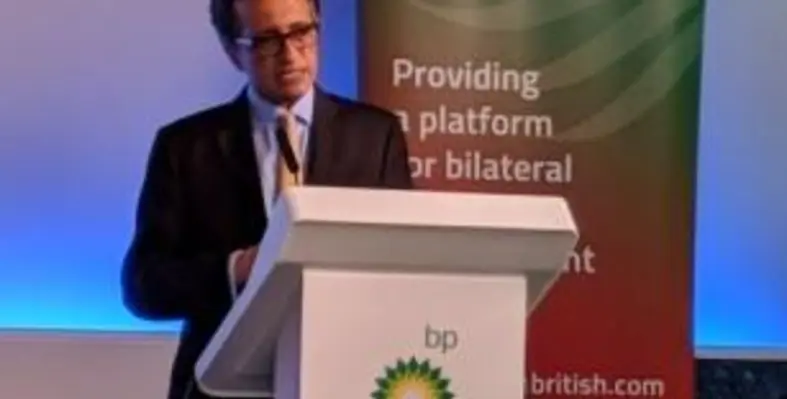Mauritania is open for business - that was the message from the north-west African countrys ambassador to the UK when he addressed a Mauritanian British Business Council (MBBC) event in London this week
HE Isselkou Ould Ahmed Izid Bih told delegates at a briefing from BP on the Greater Tortue Ahmeyim hydrocarbons development that Mauritania is "culturally diverse" and has a "very particular position geopolitically", sharing long borders with Mali, Western Sahara, Algeria and Senegal, as well as 750km of coastline. He cited Mauritania's good security record as a good reason for investing in the country's burgeoning oil and gas industry, as well as other sectors which are set to benefit from the massive offshore discovery.
"Since 2011, there has not been a single security incident in the country," the ambassador told the briefing. Mauritania will be having a general election on 22 June and the ambassador said he expects the vote to be conducted fairly and peacefully.
In regard to the Greater Tortue Ahmeyim offshore discovery, Gerry McGurk, BP's vice president, projects, for Senegal and Mauritania, updated the delegates on progress made since the 2015 Tortue discovery. FID was achieved last year and Mr McGurk says BP is still on track for first gas by 2022.
The plan is to send gas back to a hub which Mr McGurk said will be a "major LNG facility" with an FLNG plant to chill and liquefy gas so it can be transported by tanker for export and used in Senegal and Mauritania's domestic markets. An existing vessel is being upgraded at Singapore's Keppel shipyard to serve as the FLNG tanker.
Mr McGurk said the cross-border development between the two countries has presented "challenges and opportunities" but has been "uniquely successful, an amazing achievement."
Contracts have been awarded by BP to companies to assist with six delivery teams − wells, subsea, gas processing, liquefaction, hub/terminal, and offtake − and there will be opportunities for contracts and subcontracts as the project progresses and local content is increased. Mauritania does not have specific local content regulations in place but Mr McGurk said the process was currently "industry-led" in the country, with BP looking to involve local people and companies in social investment, supply chain, and staffing and skills. Nouakchott, the Mauritanian capital, is the location of a supply base and 110 Mauritanians are employed in the country's head office, and BP has just broken ground on the Nouakchott Interactive Training Centre, which Mr McGurk said will "offer opportunities to provide upskilling and build skills and expertise [such as] technician training", particularly for younger workers. In Ndiago, the town closest to the offshore operations, social investment has included a "Safe at Sea" campaign.
As well as oil and gas operators and service providers, the project is drawing on the expertise of other sectors. For example, approximately 2.8mt of rock will be required for the breakwater construction of the hub, which necessitates the repair of existing roads and the building of new roads for the quarry. This includes a bypass road around Nouakchott so trucks transporting rocks to the hub's construction site will not have to travel through the middle of the capital. Quarrying services will also be required to obtain the rocks needed for the project. BP is working closely with Mauritania's mining ministry, particularly in regard to a central processing facility for the rocks.
Next for BP is a "focus on safe delivery of the project at all global locations, ... the continued implementation of BP local content and local workforce development plans .... [and] supplier workshops and subcontractor awards". KBR is the FEED engineer for the next phase.
In regard to phases two and three, Mr McGurk said that "a few key decisions need to be made", such as how to market the LNG and financing the next phases. He said that the next tranche of contracts to go out to the market will take place in October at the earliest.
A delegate asked Mr McGurk about any plans for a gas-to-power project. Mr McGurk said that Senegal and Mauritania were "very keen on the best use for the gas" and that gas-to-power projects could help bring down electricity prices for consumers. Additionally, LNG and FLNG projects are heavy users of energy so this needs to be taken into consideration when determining the best ways to power these projects.
"BO is operating across the value chain," said Mr McGurk. "We are in discussion [as to] what the governments want to do with that gas. [To] make it accessible in the country is very good for us and good for everyone else − [this is currently] outside the scope of the project but we're looking at opportunities. The conversations are ongoing with Senegal and Mauritania."
He discussed the possibility of joint projects, depending on feasibility, citing a joint hydropower scheme between the two countries as an example of what can be achieved.
The briefing concluded with presentations from two charities which are benefiting from CSR funding and donations in Mauritania − Spana, which helps improve the health and conditions for working animals in developing countries, and Futurestars, a scheme to bring sports programmes into deprived schools.














